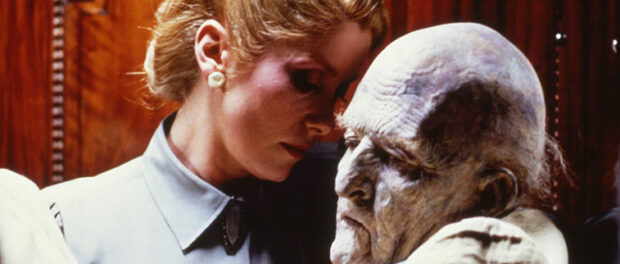The Hunger (1983)
[8]
Catherine Deneuve and David Bowie play vampire lovers living in modern-day New York who seek the help of a gerontologist played by Susan Sarandon. If that sounds oxymoronic, therein lies the rub. Bowie’s character has suddenly begun aging, following in the doomed footsteps of Deneuve’s past lovers who enjoy eternal youth for a few hundred years before mysteriously aging and dying within mere weeks. Sarandon is naturally skeptical at first, but can she resist Deneuve’s deadly appeal?
The Hunger marks the feature film debut of director Tony Scott (Revenge, True Romance), who like his brother Ridley, would leave an indelible mark in hyper-stylized cinematic storytelling. There’s barely a frame in The Hunger that isn’t decadently lit or designed. It’s also remarkable for a progressive editing style that presents suspense sequences non-linearly, flashing hints of the climax during the build-up. The electronic music score, contributed in part by Denny Jaeger and Michel Rubini, works so well marrying imagery to sound, it’s often impossible to separate the two. Special acknowledgment is also due to veteran makeup man Dick Smith (The Exorcist, Amadeus) for some of the best aging makeup ever committed to film.
Story-wise, the first act, focusing on Bowie’s deterioration, is the most original and compelling. His story arc comes to a seeming end with Deneuve placing him in a coffin in her attic, next to all her other entombed lovers — each of them cursed with full sensory awareness, even though their bodies are rotting away. There’s also an excellent suspenseful sequence in which Bowie, looking a hundred years old, attacks and feeds on a young music student playing violin for him.
I think there’s a more provocative way The Hunger could have unfolded — one that’s less of a traditional horror movie and more of a disturbing psychodrama, with Sarandon willingly joining the vampires and starting a new, eternal life with them. But even though the film takes a different route, it’s still a sumptuous, visceral piece of storytelling from a filmmaker who would become one of the decade’s most influential visionaries.
With Cliff De Young and Dan Hedaya.


